Financial Reporting: Framework, Concepts, and Assumptions
VerifiedAdded on 2021/01/02
|7
|1730
|234
Report
AI Summary
This report delves into the intricacies of financial reporting, commencing with an introduction that underscores its significance in conveying a company's financial performance to stakeholders. The main body of the report is structured around two key questions. The first question explores the conceptual framework for financial reporting, referencing the International Accounting Standards Board (IASB) and its role in standardizing financial reporting practices. It outlines the objectives of financial statements, including providing information on cash flows and resource utilization. The report then examines fundamental concepts like recognition, measurement, and financial statement preparation, along with fundamental qualities such as relevance, faithful representation, and enhancing qualities like comparability and verifiability. The second question focuses on key concepts in preparing financial statements, including recognition, measurement, and disclosure, along with basic assumptions such as economic entities, going concern, monetary unit, periodicity, and accrual basis. The report concludes by summarizing the importance of financial reporting in facilitating effective decision-making and judging investment opportunities, reinforcing the need for businesses to adhere to accounting concepts and principles.
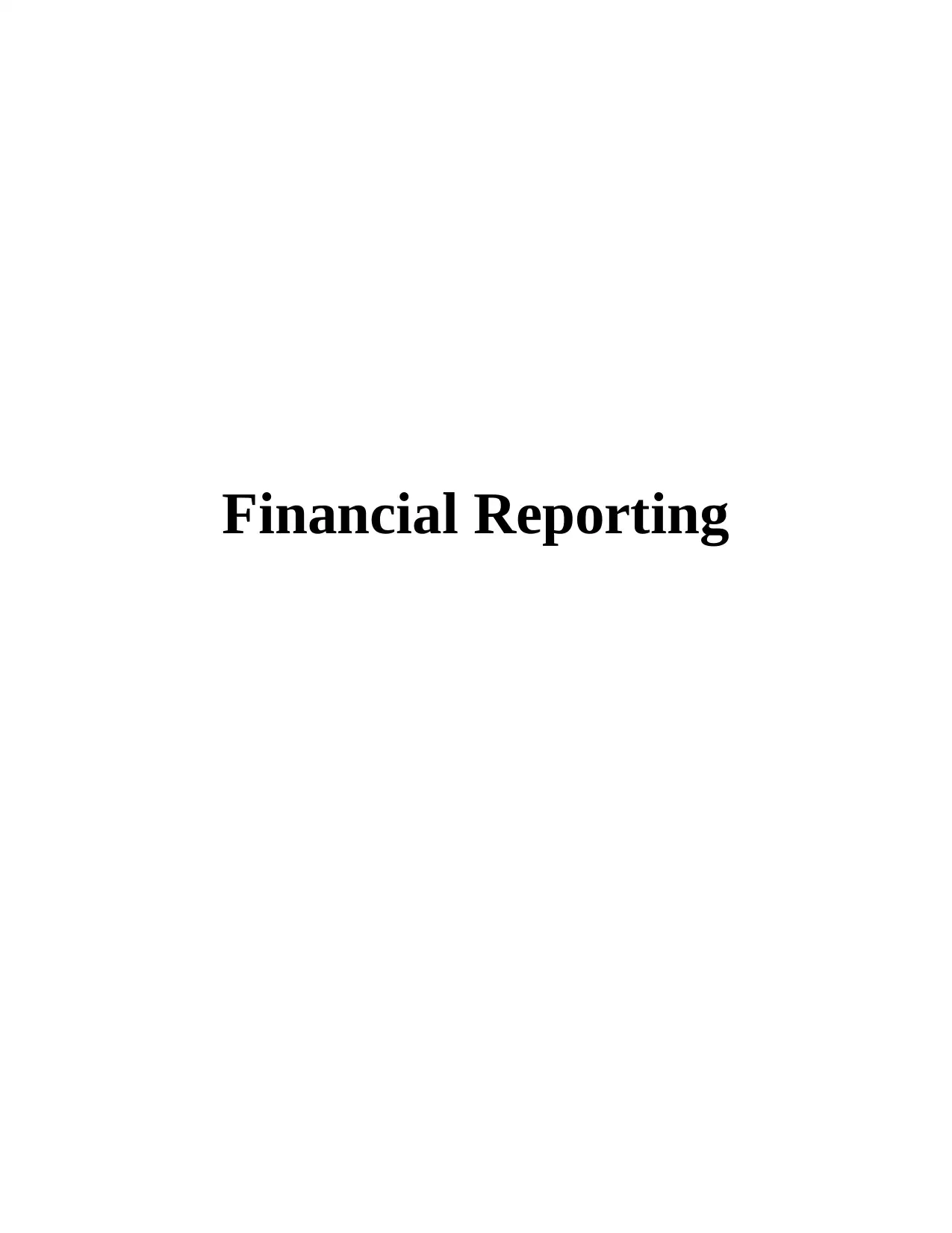
Financial Reporting
Paraphrase This Document
Need a fresh take? Get an instant paraphrase of this document with our AI Paraphraser
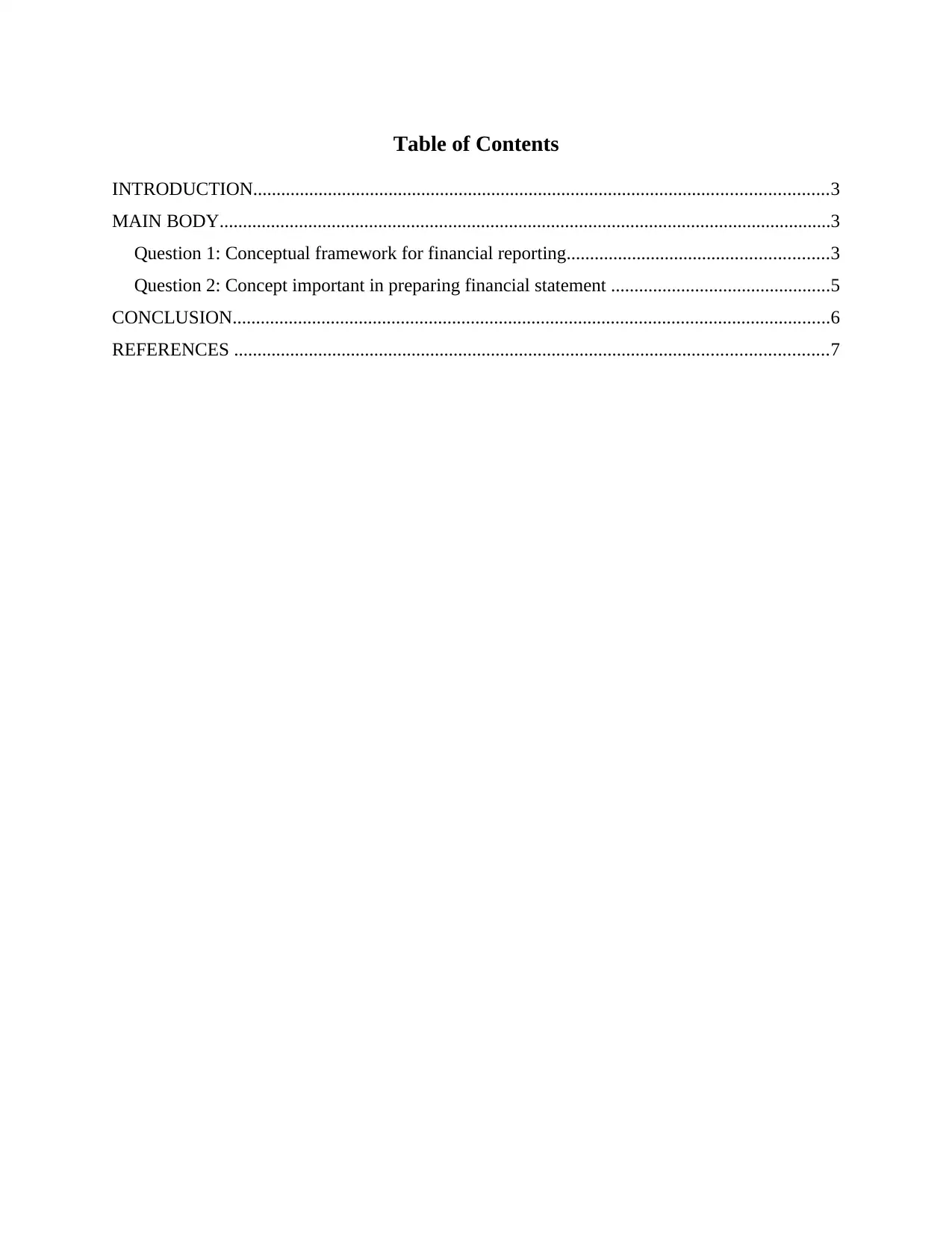
Table of Contents
INTRODUCTION...........................................................................................................................3
MAIN BODY...................................................................................................................................3
Question 1: Conceptual framework for financial reporting........................................................3
Question 2: Concept important in preparing financial statement ...............................................5
CONCLUSION................................................................................................................................6
REFERENCES ...............................................................................................................................7
INTRODUCTION...........................................................................................................................3
MAIN BODY...................................................................................................................................3
Question 1: Conceptual framework for financial reporting........................................................3
Question 2: Concept important in preparing financial statement ...............................................5
CONCLUSION................................................................................................................................6
REFERENCES ...............................................................................................................................7
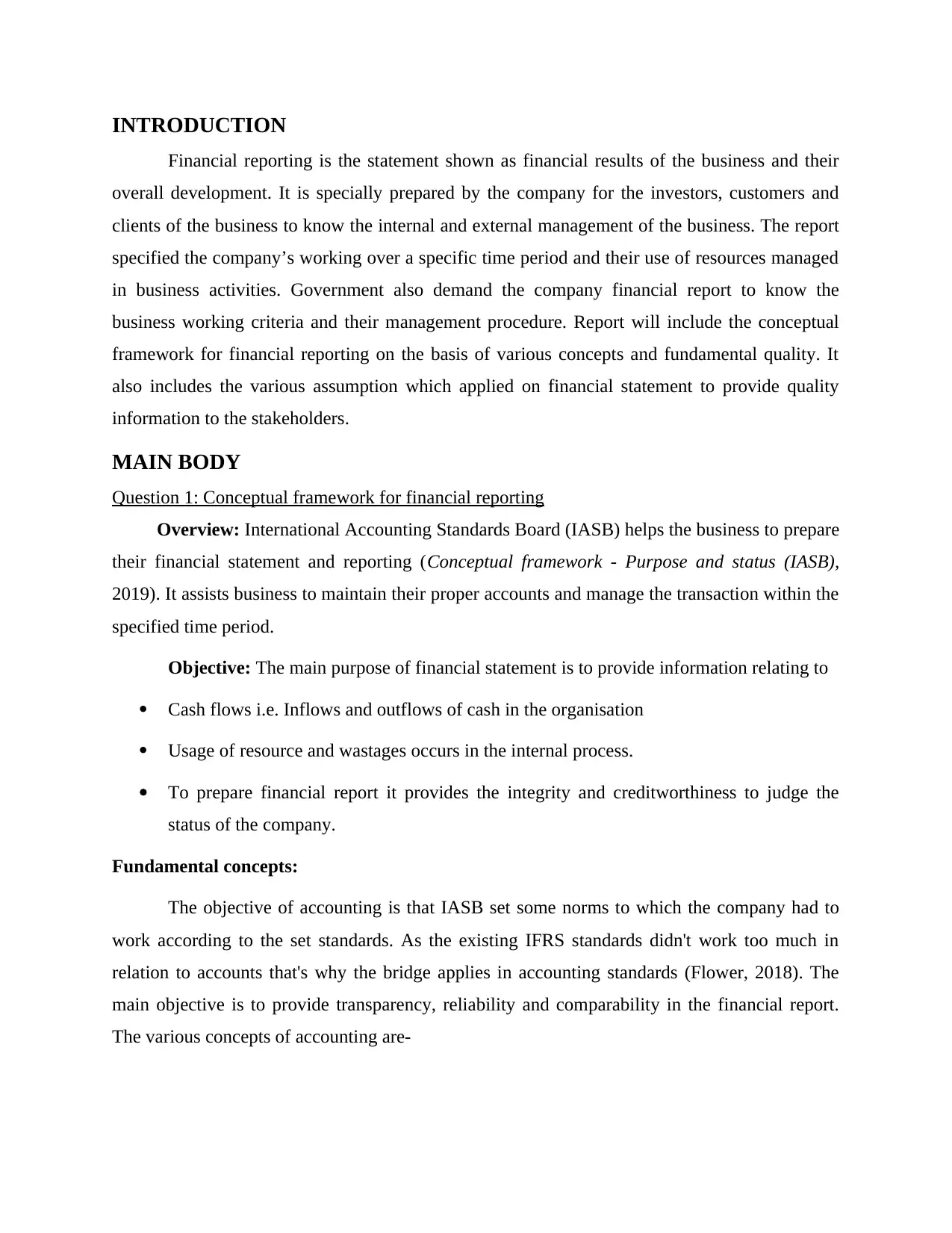
INTRODUCTION
Financial reporting is the statement shown as financial results of the business and their
overall development. It is specially prepared by the company for the investors, customers and
clients of the business to know the internal and external management of the business. The report
specified the company’s working over a specific time period and their use of resources managed
in business activities. Government also demand the company financial report to know the
business working criteria and their management procedure. Report will include the conceptual
framework for financial reporting on the basis of various concepts and fundamental quality. It
also includes the various assumption which applied on financial statement to provide quality
information to the stakeholders.
MAIN BODY
Question 1: Conceptual framework for financial reporting
Overview: International Accounting Standards Board (IASB) helps the business to prepare
their financial statement and reporting (Conceptual framework - Purpose and status (IASB),
2019). It assists business to maintain their proper accounts and manage the transaction within the
specified time period.
Objective: The main purpose of financial statement is to provide information relating to
Cash flows i.e. Inflows and outflows of cash in the organisation
Usage of resource and wastages occurs in the internal process.
To prepare financial report it provides the integrity and creditworthiness to judge the
status of the company.
Fundamental concepts:
The objective of accounting is that IASB set some norms to which the company had to
work according to the set standards. As the existing IFRS standards didn't work too much in
relation to accounts that's why the bridge applies in accounting standards (Flower, 2018). The
main objective is to provide transparency, reliability and comparability in the financial report.
The various concepts of accounting are-
Financial reporting is the statement shown as financial results of the business and their
overall development. It is specially prepared by the company for the investors, customers and
clients of the business to know the internal and external management of the business. The report
specified the company’s working over a specific time period and their use of resources managed
in business activities. Government also demand the company financial report to know the
business working criteria and their management procedure. Report will include the conceptual
framework for financial reporting on the basis of various concepts and fundamental quality. It
also includes the various assumption which applied on financial statement to provide quality
information to the stakeholders.
MAIN BODY
Question 1: Conceptual framework for financial reporting
Overview: International Accounting Standards Board (IASB) helps the business to prepare
their financial statement and reporting (Conceptual framework - Purpose and status (IASB),
2019). It assists business to maintain their proper accounts and manage the transaction within the
specified time period.
Objective: The main purpose of financial statement is to provide information relating to
Cash flows i.e. Inflows and outflows of cash in the organisation
Usage of resource and wastages occurs in the internal process.
To prepare financial report it provides the integrity and creditworthiness to judge the
status of the company.
Fundamental concepts:
The objective of accounting is that IASB set some norms to which the company had to
work according to the set standards. As the existing IFRS standards didn't work too much in
relation to accounts that's why the bridge applies in accounting standards (Flower, 2018). The
main objective is to provide transparency, reliability and comparability in the financial report.
The various concepts of accounting are-
⊘ This is a preview!⊘
Do you want full access?
Subscribe today to unlock all pages.

Trusted by 1+ million students worldwide
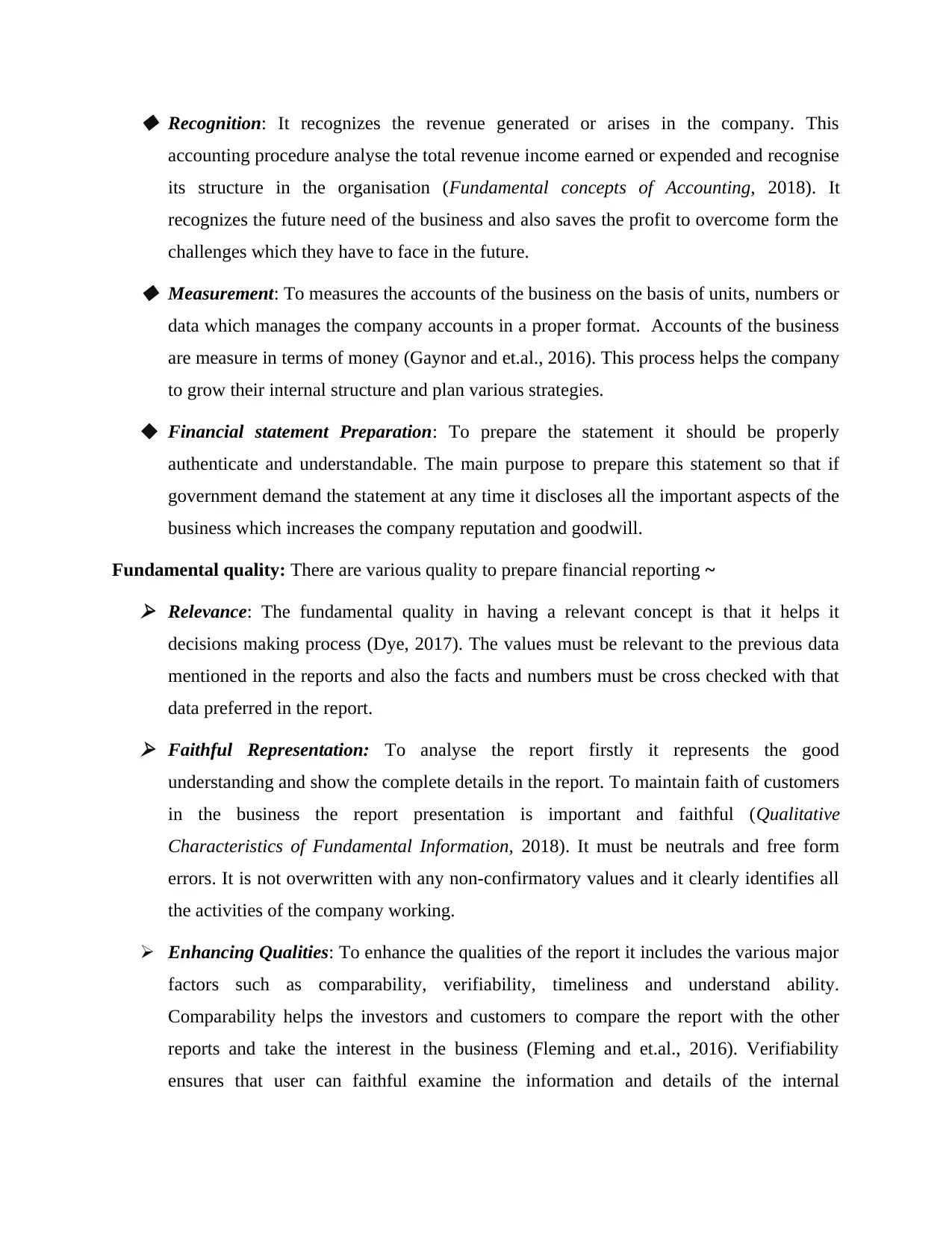
Recognition: It recognizes the revenue generated or arises in the company. This
accounting procedure analyse the total revenue income earned or expended and recognise
its structure in the organisation (Fundamental concepts of Accounting, 2018). It
recognizes the future need of the business and also saves the profit to overcome form the
challenges which they have to face in the future. Measurement: To measures the accounts of the business on the basis of units, numbers or
data which manages the company accounts in a proper format. Accounts of the business
are measure in terms of money (Gaynor and et.al., 2016). This process helps the company
to grow their internal structure and plan various strategies.
Financial statement Preparation: To prepare the statement it should be properly
authenticate and understandable. The main purpose to prepare this statement so that if
government demand the statement at any time it discloses all the important aspects of the
business which increases the company reputation and goodwill.
Fundamental quality: There are various quality to prepare financial reporting ~ Relevance: The fundamental quality in having a relevant concept is that it helps it
decisions making process (Dye, 2017). The values must be relevant to the previous data
mentioned in the reports and also the facts and numbers must be cross checked with that
data preferred in the report. Faithful Representation: To analyse the report firstly it represents the good
understanding and show the complete details in the report. To maintain faith of customers
in the business the report presentation is important and faithful (Qualitative
Characteristics of Fundamental Information, 2018). It must be neutrals and free form
errors. It is not overwritten with any non-confirmatory values and it clearly identifies all
the activities of the company working.
Enhancing Qualities: To enhance the qualities of the report it includes the various major
factors such as comparability, verifiability, timeliness and understand ability.
Comparability helps the investors and customers to compare the report with the other
reports and take the interest in the business (Fleming and et.al., 2016). Verifiability
ensures that user can faithful examine the information and details of the internal
accounting procedure analyse the total revenue income earned or expended and recognise
its structure in the organisation (Fundamental concepts of Accounting, 2018). It
recognizes the future need of the business and also saves the profit to overcome form the
challenges which they have to face in the future. Measurement: To measures the accounts of the business on the basis of units, numbers or
data which manages the company accounts in a proper format. Accounts of the business
are measure in terms of money (Gaynor and et.al., 2016). This process helps the company
to grow their internal structure and plan various strategies.
Financial statement Preparation: To prepare the statement it should be properly
authenticate and understandable. The main purpose to prepare this statement so that if
government demand the statement at any time it discloses all the important aspects of the
business which increases the company reputation and goodwill.
Fundamental quality: There are various quality to prepare financial reporting ~ Relevance: The fundamental quality in having a relevant concept is that it helps it
decisions making process (Dye, 2017). The values must be relevant to the previous data
mentioned in the reports and also the facts and numbers must be cross checked with that
data preferred in the report. Faithful Representation: To analyse the report firstly it represents the good
understanding and show the complete details in the report. To maintain faith of customers
in the business the report presentation is important and faithful (Qualitative
Characteristics of Fundamental Information, 2018). It must be neutrals and free form
errors. It is not overwritten with any non-confirmatory values and it clearly identifies all
the activities of the company working.
Enhancing Qualities: To enhance the qualities of the report it includes the various major
factors such as comparability, verifiability, timeliness and understand ability.
Comparability helps the investors and customers to compare the report with the other
reports and take the interest in the business (Fleming and et.al., 2016). Verifiability
ensures that user can faithful examine the information and details of the internal
Paraphrase This Document
Need a fresh take? Get an instant paraphrase of this document with our AI Paraphraser
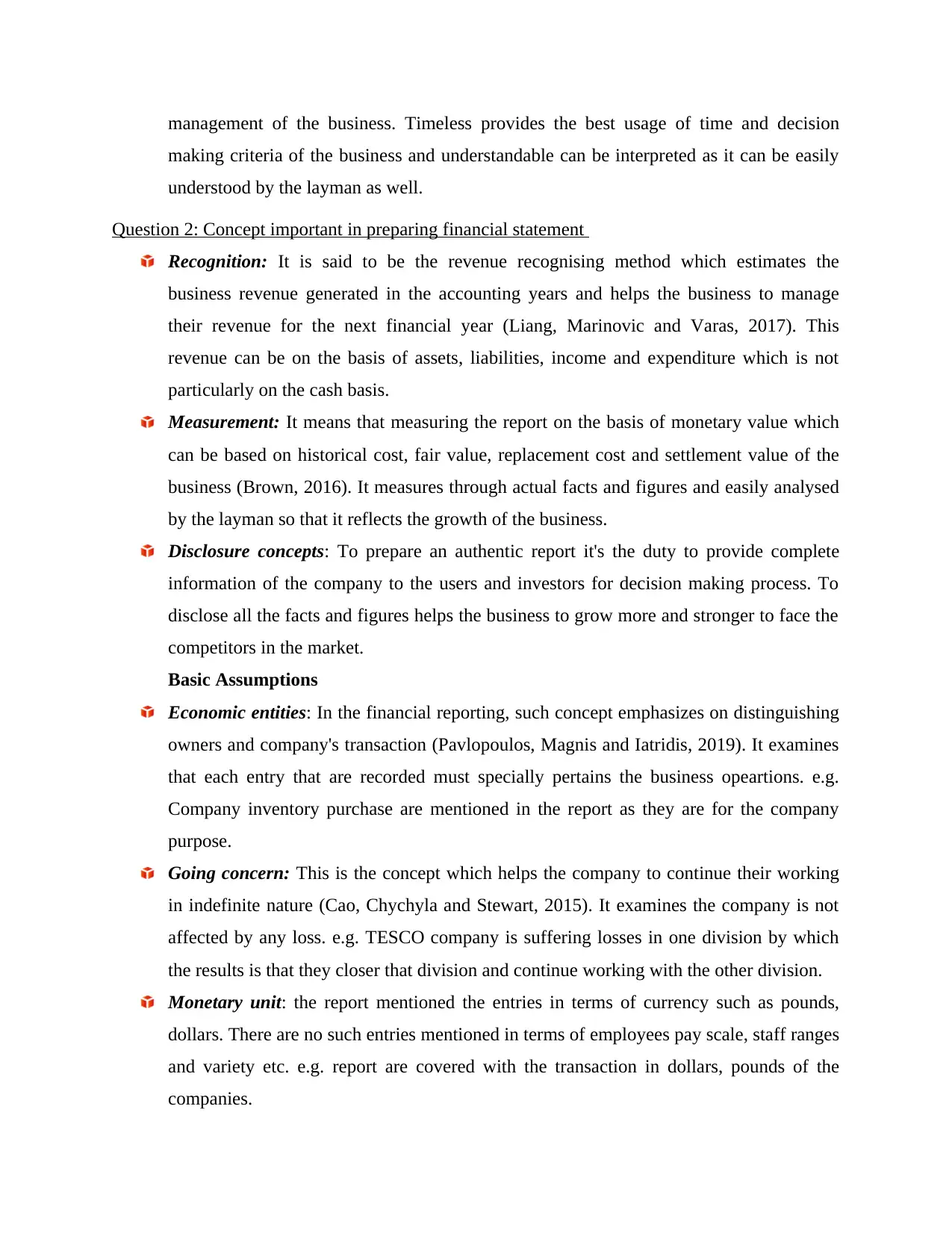
management of the business. Timeless provides the best usage of time and decision
making criteria of the business and understandable can be interpreted as it can be easily
understood by the layman as well.
Question 2: Concept important in preparing financial statement
Recognition: It is said to be the revenue recognising method which estimates the
business revenue generated in the accounting years and helps the business to manage
their revenue for the next financial year (Liang, Marinovic and Varas, 2017). This
revenue can be on the basis of assets, liabilities, income and expenditure which is not
particularly on the cash basis.
Measurement: It means that measuring the report on the basis of monetary value which
can be based on historical cost, fair value, replacement cost and settlement value of the
business (Brown, 2016). It measures through actual facts and figures and easily analysed
by the layman so that it reflects the growth of the business.
Disclosure concepts: To prepare an authentic report it's the duty to provide complete
information of the company to the users and investors for decision making process. To
disclose all the facts and figures helps the business to grow more and stronger to face the
competitors in the market.
Basic Assumptions
Economic entities: In the financial reporting, such concept emphasizes on distinguishing
owners and company's transaction (Pavlopoulos, Magnis and Iatridis, 2019). It examines
that each entry that are recorded must specially pertains the business opeartions. e.g.
Company inventory purchase are mentioned in the report as they are for the company
purpose.
Going concern: This is the concept which helps the company to continue their working
in indefinite nature (Cao, Chychyla and Stewart, 2015). It examines the company is not
affected by any loss. e.g. TESCO company is suffering losses in one division by which
the results is that they closer that division and continue working with the other division.
Monetary unit: the report mentioned the entries in terms of currency such as pounds,
dollars. There are no such entries mentioned in terms of employees pay scale, staff ranges
and variety etc. e.g. report are covered with the transaction in dollars, pounds of the
companies.
making criteria of the business and understandable can be interpreted as it can be easily
understood by the layman as well.
Question 2: Concept important in preparing financial statement
Recognition: It is said to be the revenue recognising method which estimates the
business revenue generated in the accounting years and helps the business to manage
their revenue for the next financial year (Liang, Marinovic and Varas, 2017). This
revenue can be on the basis of assets, liabilities, income and expenditure which is not
particularly on the cash basis.
Measurement: It means that measuring the report on the basis of monetary value which
can be based on historical cost, fair value, replacement cost and settlement value of the
business (Brown, 2016). It measures through actual facts and figures and easily analysed
by the layman so that it reflects the growth of the business.
Disclosure concepts: To prepare an authentic report it's the duty to provide complete
information of the company to the users and investors for decision making process. To
disclose all the facts and figures helps the business to grow more and stronger to face the
competitors in the market.
Basic Assumptions
Economic entities: In the financial reporting, such concept emphasizes on distinguishing
owners and company's transaction (Pavlopoulos, Magnis and Iatridis, 2019). It examines
that each entry that are recorded must specially pertains the business opeartions. e.g.
Company inventory purchase are mentioned in the report as they are for the company
purpose.
Going concern: This is the concept which helps the company to continue their working
in indefinite nature (Cao, Chychyla and Stewart, 2015). It examines the company is not
affected by any loss. e.g. TESCO company is suffering losses in one division by which
the results is that they closer that division and continue working with the other division.
Monetary unit: the report mentioned the entries in terms of currency such as pounds,
dollars. There are no such entries mentioned in terms of employees pay scale, staff ranges
and variety etc. e.g. report are covered with the transaction in dollars, pounds of the
companies.
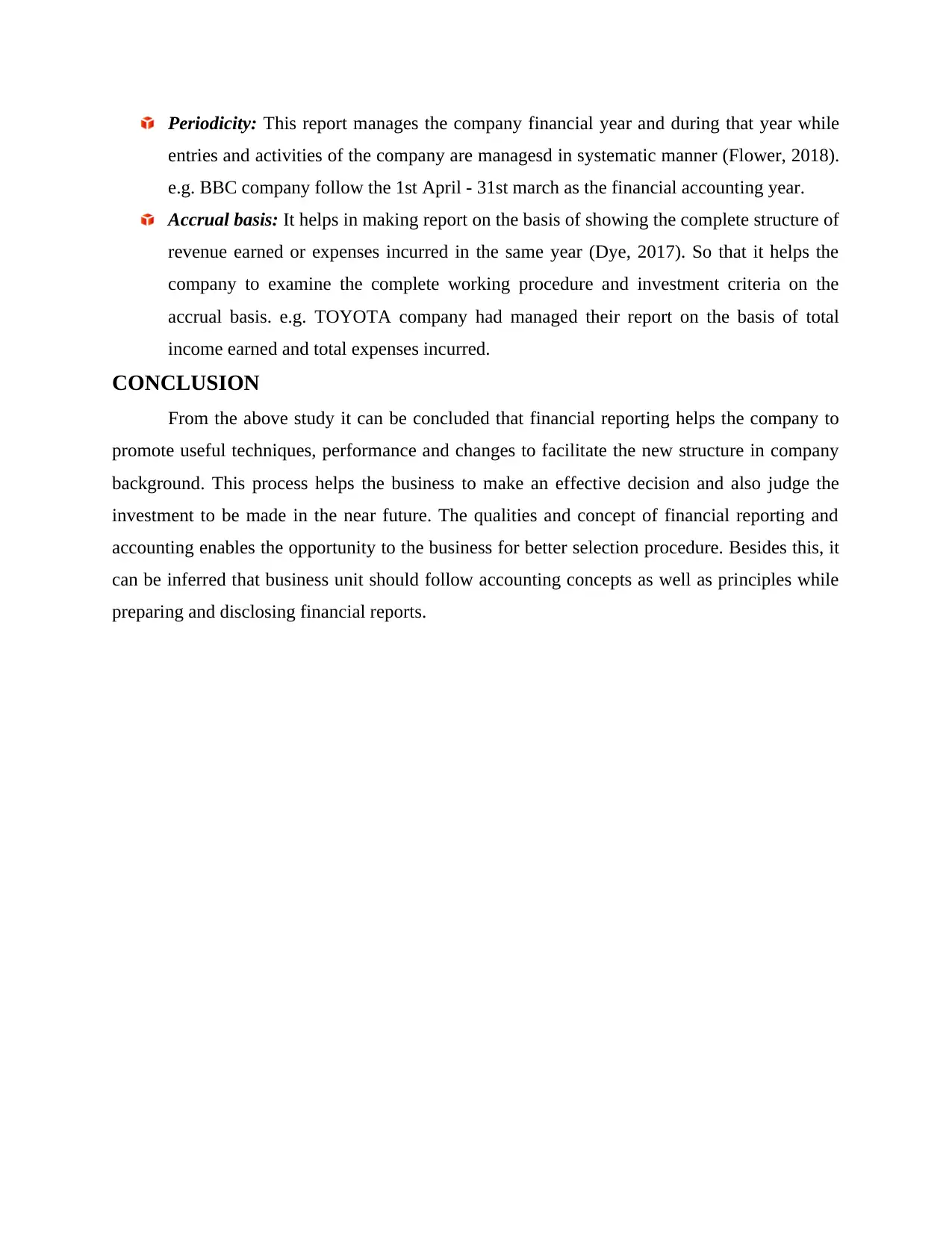
Periodicity: This report manages the company financial year and during that year while
entries and activities of the company are managesd in systematic manner (Flower, 2018).
e.g. BBC company follow the 1st April - 31st march as the financial accounting year.
Accrual basis: It helps in making report on the basis of showing the complete structure of
revenue earned or expenses incurred in the same year (Dye, 2017). So that it helps the
company to examine the complete working procedure and investment criteria on the
accrual basis. e.g. TOYOTA company had managed their report on the basis of total
income earned and total expenses incurred.
CONCLUSION
From the above study it can be concluded that financial reporting helps the company to
promote useful techniques, performance and changes to facilitate the new structure in company
background. This process helps the business to make an effective decision and also judge the
investment to be made in the near future. The qualities and concept of financial reporting and
accounting enables the opportunity to the business for better selection procedure. Besides this, it
can be inferred that business unit should follow accounting concepts as well as principles while
preparing and disclosing financial reports.
entries and activities of the company are managesd in systematic manner (Flower, 2018).
e.g. BBC company follow the 1st April - 31st march as the financial accounting year.
Accrual basis: It helps in making report on the basis of showing the complete structure of
revenue earned or expenses incurred in the same year (Dye, 2017). So that it helps the
company to examine the complete working procedure and investment criteria on the
accrual basis. e.g. TOYOTA company had managed their report on the basis of total
income earned and total expenses incurred.
CONCLUSION
From the above study it can be concluded that financial reporting helps the company to
promote useful techniques, performance and changes to facilitate the new structure in company
background. This process helps the business to make an effective decision and also judge the
investment to be made in the near future. The qualities and concept of financial reporting and
accounting enables the opportunity to the business for better selection procedure. Besides this, it
can be inferred that business unit should follow accounting concepts as well as principles while
preparing and disclosing financial reports.
⊘ This is a preview!⊘
Do you want full access?
Subscribe today to unlock all pages.

Trusted by 1+ million students worldwide
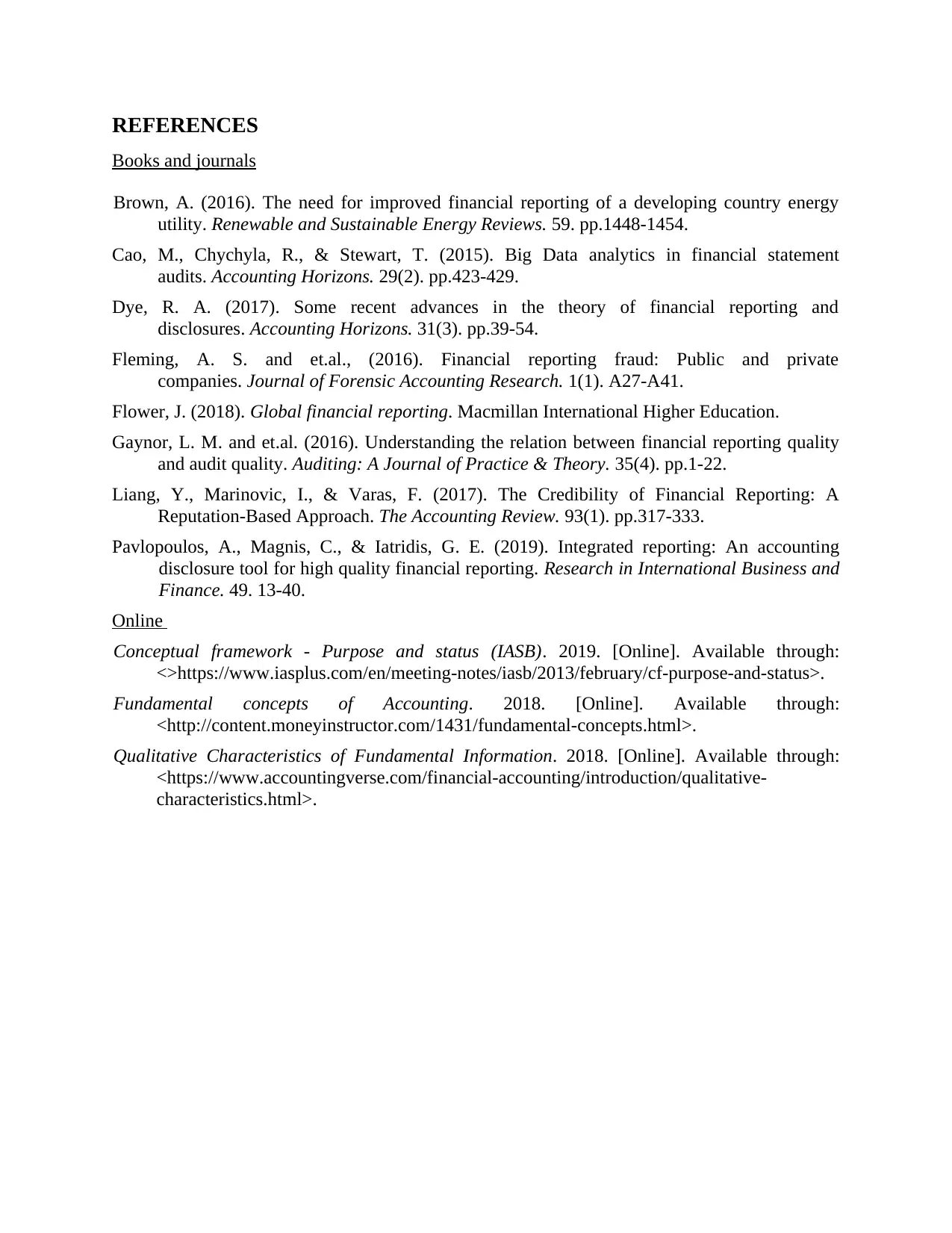
REFERENCES
Books and journals
Brown, A. (2016). The need for improved financial reporting of a developing country energy
utility. Renewable and Sustainable Energy Reviews. 59. pp.1448-1454.
Cao, M., Chychyla, R., & Stewart, T. (2015). Big Data analytics in financial statement
audits. Accounting Horizons. 29(2). pp.423-429.
Dye, R. A. (2017). Some recent advances in the theory of financial reporting and
disclosures. Accounting Horizons. 31(3). pp.39-54.
Fleming, A. S. and et.al., (2016). Financial reporting fraud: Public and private
companies. Journal of Forensic Accounting Research. 1(1). A27-A41.
Flower, J. (2018). Global financial reporting. Macmillan International Higher Education.
Gaynor, L. M. and et.al. (2016). Understanding the relation between financial reporting quality
and audit quality. Auditing: A Journal of Practice & Theory. 35(4). pp.1-22.
Liang, Y., Marinovic, I., & Varas, F. (2017). The Credibility of Financial Reporting: A
Reputation-Based Approach. The Accounting Review. 93(1). pp.317-333.
Pavlopoulos, A., Magnis, C., & Iatridis, G. E. (2019). Integrated reporting: An accounting
disclosure tool for high quality financial reporting. Research in International Business and
Finance. 49. 13-40.
Online
Conceptual framework - Purpose and status (IASB). 2019. [Online]. Available through:
<>https://www.iasplus.com/en/meeting-notes/iasb/2013/february/cf-purpose-and-status>.
Fundamental concepts of Accounting. 2018. [Online]. Available through:
<http://content.moneyinstructor.com/1431/fundamental-concepts.html>.
Qualitative Characteristics of Fundamental Information. 2018. [Online]. Available through:
<https://www.accountingverse.com/financial-accounting/introduction/qualitative-
characteristics.html>.
Books and journals
Brown, A. (2016). The need for improved financial reporting of a developing country energy
utility. Renewable and Sustainable Energy Reviews. 59. pp.1448-1454.
Cao, M., Chychyla, R., & Stewart, T. (2015). Big Data analytics in financial statement
audits. Accounting Horizons. 29(2). pp.423-429.
Dye, R. A. (2017). Some recent advances in the theory of financial reporting and
disclosures. Accounting Horizons. 31(3). pp.39-54.
Fleming, A. S. and et.al., (2016). Financial reporting fraud: Public and private
companies. Journal of Forensic Accounting Research. 1(1). A27-A41.
Flower, J. (2018). Global financial reporting. Macmillan International Higher Education.
Gaynor, L. M. and et.al. (2016). Understanding the relation between financial reporting quality
and audit quality. Auditing: A Journal of Practice & Theory. 35(4). pp.1-22.
Liang, Y., Marinovic, I., & Varas, F. (2017). The Credibility of Financial Reporting: A
Reputation-Based Approach. The Accounting Review. 93(1). pp.317-333.
Pavlopoulos, A., Magnis, C., & Iatridis, G. E. (2019). Integrated reporting: An accounting
disclosure tool for high quality financial reporting. Research in International Business and
Finance. 49. 13-40.
Online
Conceptual framework - Purpose and status (IASB). 2019. [Online]. Available through:
<>https://www.iasplus.com/en/meeting-notes/iasb/2013/february/cf-purpose-and-status>.
Fundamental concepts of Accounting. 2018. [Online]. Available through:
<http://content.moneyinstructor.com/1431/fundamental-concepts.html>.
Qualitative Characteristics of Fundamental Information. 2018. [Online]. Available through:
<https://www.accountingverse.com/financial-accounting/introduction/qualitative-
characteristics.html>.
1 out of 7
Related Documents
Your All-in-One AI-Powered Toolkit for Academic Success.
+13062052269
info@desklib.com
Available 24*7 on WhatsApp / Email
![[object Object]](/_next/static/media/star-bottom.7253800d.svg)
Unlock your academic potential
Copyright © 2020–2026 A2Z Services. All Rights Reserved. Developed and managed by ZUCOL.




